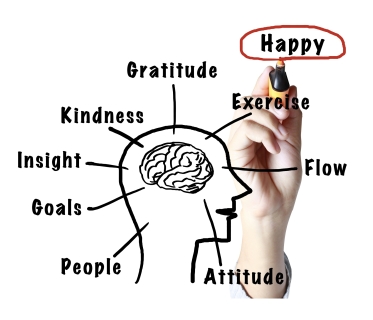
After working in many high-achieving environments like Yale, Stanford, Silicon Valley, New York City, I noticed too many people were pursuing “success” at a cost to themselves. They were postponing their happiness now in pursuit of success with the idea that, when they attain success, they will be happy. Yet they were burning themselves out (and others) in the process. I, too, joined the rat race because it seemed like what everyone was doing. It seemed like the right thing to do. But it wasn’t.
When I looked at the research, I saw that—overwhelmingly— happiness is actually the secret to success. If you prioritize your happiness, you will actually be more productive, more creative, more resilient, more energized, more charismatic and influential. You will have more willpower and be more focused, with less effort. That’s why I wrote my book The Happiness Track.
You can either listen to common (yet false!) theories of success: work yourself into the ground, stay focused on your future goals, focus nonstop, you can’t have success without stress, look out for yourself first and foremost and be your own worst critic… OR you can listen to the data which tells you the opposite: Take time off and you’ll be more innovative, stay present and you’ll be more productive and charismatic, take time to be idle and have fun and you’ll actually be more creative and more likely to have innovative breakthroughs, nurture calmness in your life and you’ll have more energy to get more work done, be kind to others and you’ll be more successful and be self-compassionate and you’ll be more resilient.

For example, we’re also taught that the only way to get ahead is to drive ourselves into the ground —one of the reasons we are seeing 50% burnout rates across industries. 70% of the US workforce is unengaged, a Gallup survey shows. We’re facing a crisis of high stress coupled with the inevitable exhaustion that comes from living an adrenaline-filled life. We are taught we’ll get more done if we’re stressed and that you simply can’t have success without stress. WRONG. What you’ll do is simply burn yourself out faster. Sure, a little stress can help get you through a deadline. But when it’s chronic, day after day, fueled by too much caffeine and a go-go-go attitude, it hurts more than it helps.
This is where exercises like breathing, yoga, and meditation come into play. They are not just a fad; they are ways you can train your nervous system to calm back down. Instead of always activating your fight-or-flight stress response, you start to strengthen the rest-and-digest calming response. With less stress, your decision-making and emotional intelligence will be better, and you will manage your energy instead. SATTVA is a popular meditation app with lots of different options.
We also believe that we should be self-critical. After all, self-criticism leads to self-improvement right? Wrong again. Research shows that self-criticism is basically self-sabotage whereas self-compassion, ie. treating yourself with the understanding, mindfulness and kindness with which you would treat a friend, leads to far greater resilience, productivity, and well-being.
 Similarly, we’re often told to look out of ourselves first and foremost. After all, we believe, it’s a dog-eat-dog world. Yet research show that being kind to others and going out of your way to help whenever and wherever you can actually ends up not only benefitting those around you but also making you more happy, healthy, and productive. Your colleagues are loyal to you, your team functions better and more productively, and the end result is a win-win for all. To nurture both self-compassion and compassion for others, try practicing loving-kindness meditation. Brain-imaging research my colleagues and I conducted at Stanford showed that even a very short 7-minute Loving-Kindness Meditation boosts your happiness and helps you feel closer to others. The meditation we used in our study can be found on the SATTVA app or on Youtube.
Similarly, we’re often told to look out of ourselves first and foremost. After all, we believe, it’s a dog-eat-dog world. Yet research show that being kind to others and going out of your way to help whenever and wherever you can actually ends up not only benefitting those around you but also making you more happy, healthy, and productive. Your colleagues are loyal to you, your team functions better and more productively, and the end result is a win-win for all. To nurture both self-compassion and compassion for others, try practicing loving-kindness meditation. Brain-imaging research my colleagues and I conducted at Stanford showed that even a very short 7-minute Loving-Kindness Meditation boosts your happiness and helps you feel closer to others. The meditation we used in our study can be found on the SATTVA app or on Youtube.
Whether you’re a business leader or a stay-at-home mom trying to keep up, the data is clear: if you take care of yourself and others, if you take time off and find joy in your life, you will be more successful at achieving your goals, not to mention fulfilled. And if you need more inspiration, let the science inspire you. Log onto sites like Fulfillment Daily to read up on the latest research on the psychology of happiness. Download the Happify app to help you implement that data into your daily life.
 Emma Seppala is the author of The Happiness Track, and Science Director of Stanford University’s Center for Compassion and Altruism Research and Education, leadership writer for Harvard Business Review, and leading expert on health psychology, well-being, and resilience.
Emma Seppala is the author of The Happiness Track, and Science Director of Stanford University’s Center for Compassion and Altruism Research and Education, leadership writer for Harvard Business Review, and leading expert on health psychology, well-being, and resilience.










